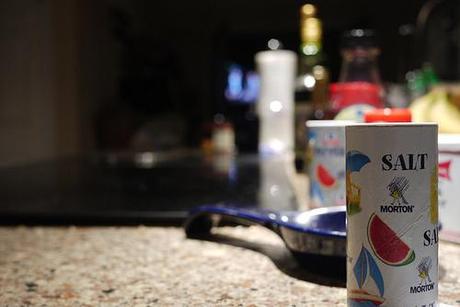Hey guys! Today I’d like to say a big thanks to everyone who has ever guest posted on Rohan 7 Things. Without you guys my blog would be such a boring place while I focus on music at the moment :) One such amazing person is Rarasaur. A blogger whom I’ve had the pleasure of guesting for and spoken to on many occasions. As you may or may not know she is going through some very unfair legal trouble at the moment. Please read more here and help out in any way you can. Thank you! As for today post, I’ll hand you over to Silvia Marks, take it away Silvia! :)
How to Reduce Your Salt Intake
Salt is considered without doubt very dangerous for everyone’s health if taken too often. It is true that we cannot live without salt intake, however we should be well aware of the risks that are hidden behind the salt. It consists of sodium and chloride and as sodium helps for maintaining the blood’s water content, salt is more than necessary substance for your body. Despite this fact many people consume more salt than they need. You only need 2.3 grams of sodium intake which is more than enough for your body.

For people who suffer from high blood pressure eating less sodium is more than recommended. This can also help reduce the risk of heart diseases.
There exist some ways in which you can reduce the salt intake without significantly feel its absence while you are eating. Thanks to this article kindly presented by Chiswick HireHouseCleaner, you will be acquainted with some useful tips, regarding the proper salt intake.
- The first thing you should is to read carefully the labels when shopping. Look for cereals, crackers and pasta sauces that contain less sodium in them. Instead, choose foods with low salt options. Take into account that sometimes the high sugar content in a product, can also mask the high sodium content so remember to check every label for sodium content.
- If you have noticed that your food is rich in salt you can significantly balance it by adding some high potassium food. Fresh fruit and vegetables are more than appropriate in such cases.
- When you start cooking do not put the salt immediately in the meal, but wait until the end. In this way you will need to add much less amount. The longer the food is cooked the more the salty amount is muted and at the end the taste will be on the top layer.
- Before dining out in your favorite restaurant do some research and visit the restaurant’s website. Usually there you can find information about the sodium content of some of the dishes served there. However if that’s not possible you can request the dish to be served without salt.
- Use fresh rather than packaged meat because the fresh chicken or pork contain natural sodium which is far more harmless than the extra sodium that is added during the processing in products like bacon or ham. If this food item remains its good appearance for more days in the fridge that is a sign that sodium content is too high.
- Make a comparison between the different kinds of food until you find the one with the lowest sodium content in it, because different brands offer different amount of sodium in them.
- If you want to buy frozen vegetables you can try to choose those ones who are labelled ”fresh frozen” and avoid those who contain seasoning or sauces.
- Rinse the canned vegetables like corn or beans before heating as that may reduce their sodium content from 9 to 23 per cent
These are some of the useful tips thanks to which you can control effectively the daily salt intake. Many people underestimate the bad influence of the salt and realize the consequences too late. If you want to prepare meals with less salt you can try to reduce it little by little. Instead you can try to use spices and healthy herbs. Another option is to use low-salt ingredients wherever it is possible. If you have more serious health problems you may need to go on a low-sodium diet in order to change the whole regime, however you should first make a consultation and have the professional opinion of your doctor.
